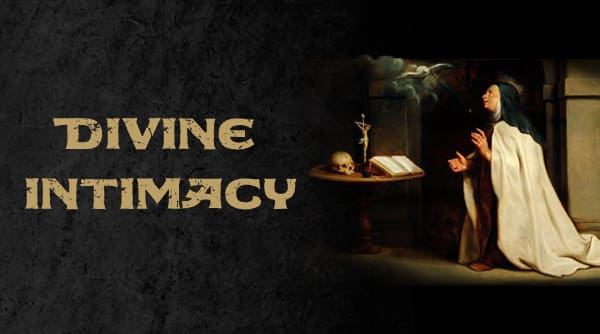Solemnity of the Annunciation of the Lord
Presence of God— At your side, O Mary, I wish to learn how to repeat in every circumstance your “Ecce ancilla Domini!” Behold the handmaid of the Lord.
MEDITATION
Let us try, through the inspired narrative of St. Luke (Gospel:1: 26-38), to enter into the dispositions of Mary’s soul at the time of the Annunciation.
The Angel sent by God finds the Virgin recollected in solitude, and “being come in,” says to her: “Hail, full of grace, the Lord is with thee: blessed art thou among women.” At these words, according to the sacred text, Mary is “troubled”; we must not, however, take this phrase to mean real disturbance, which destroys the peace of the spirit; it means rather a profound astonishment at this unusual greeting, an astonishment so great as to cause a kind of fear. This is Mary’s first reaction to the angelical message, a reaction arising from her deep humility, which makes her think this extraordinary eulogy very strange.
Meanwhile, the Angel communicates to her his great message: God wishes her to become the Mother of the Redeemer. Mary had always lived under the continual direction of the Holy Spirit and under His inspiration had made a vow of virginity; therefore, she was convinced that she should remain a virgin and that this was God’s will. But now God lets her know that He has chosen her to be the Mother of His Son, and she, humble handmaid that she is, is ready to adhere to the divine plan. However, she does not yet understand how she can be at the same time a mother and a virgin, and she questions the Angel on this point: “How shall this be done?” The Angel explains: “The Holy Spirit shall come upon thee and the power of the Most High shall overshadow thee.” Her maternity will be the direct work of the Holy Spirit and will respect her virginity.
The will of God is then entirely clear to Mary, and she, who during her whole life has always been moved by the divine will alone, accepts it immediately, with an entire adherence and a most intense pure love: “Behold the handmaid of the Lord, be it done to me according to Thy word.” The total acceptance is accompanied by a total donation: Mary accepts by offering herself, and she offers herself by giving herself. She offers herself as a servant, or rather, as a slave, if we take the word in the full sense of the Greek text; she gives herself by abandoning herself as a prey to the divine will, accepting by anticipation everything that God may ask of her. Her adherence to Him is both active and passive: Mary wills all that God wills, and she accepts all that He does. Thus Mary appears as the model of a soul completely united to God, fully given up to His divine will.
COLLOQUY
“Hail Mary, full of grace, the Lord is with thee! Not only is God the Son with you, to whom you gave your blood, but also God the Holy Spirit, by means of whose operation you conceived, and also God the Father, who generated from all eternity Him whom you conceived. The Father, who gives you His Son, is with you; the Son is with you, who, wishing to accomplish a prodigious mystery, conceals Himself in your maternal bosom without violating your virginal integrity; the Holy Spirit is with you, who, together with the Father and the Son, sanctifies you. God is truly with you” (St. Bernard).
“O Mary, Mary, temple of the Trinity … O Mary, vessel of humility, you were pleasing to the eternal Father, and in His own singular love, He has captivated you and drawn you to Him. By the fire of your charity, by the unction of your humility, you have drawn the Divinity to come within you.
“Did fear disturb you at the Angel’s word, O Mary? It does not seem that it did, although you were astonished. At what, then, were you astonished? At the great goodness of God, when, considering yourself, you knew you were unworthy of so great a grace. You wondered at the sight of your unworthiness, your weakness and at God’s ineffable grace … and thus you showed profound humility. But there also appears today in you, O Mary, the dignity and liberty of man, for before the Word was made incarnate, the Angel was sent to ask your consent. The Son of God did not descend into your bosom before you had consented; He waited at the door of your will which you opened to Him, for although He wanted to come to you, He would never have entered if you had not opened to Him saying: ‘Behold the handmaid of the Lord, be it done unto me according to Thy word ….’
“O Mary, my sweet love, you opened to the eternal Divinity the door of your will, and the Word immediately became incarnate within you. By this you teach me that God, who created me without my help, will not save me without it … but knocks at the door of my will and waits for me to open it to Him” (St. Catherine of Siena).
O Mary, by the ineffable mystery which was accomplished in you I beg you to teach me and help me always to open wide the door of my soul to every divine appeal, to every solicitation of grace. At each manifestation of the divine will, may I repeat with you a humble, prompt, “Ecce, fiat!”
*
 Note from Dan: This post on the “Solemnity of the Annunciation of the Lord” is provided courtesy of Baronius Press and contains one of two meditations for the day. If you would like to get the full meditation from one of the best daily meditation works ever compiled, you can learn more here: Divine Intimacy. Please honor those who support us by purchasing and promoting their products.
Note from Dan: This post on the “Solemnity of the Annunciation of the Lord” is provided courtesy of Baronius Press and contains one of two meditations for the day. If you would like to get the full meditation from one of the best daily meditation works ever compiled, you can learn more here: Divine Intimacy. Please honor those who support us by purchasing and promoting their products.
Art for this post on the “Solemnity of the Annunciation of the Lord”: The Annunciation, Bartolomé Esteban Perez Murillo, 1665-1660, PD-US author’s life plus 100 years or less, PD-Worldwide, Wikimedia Commons. Father Gabriel of St. Mary Magdalen, mirror from open source material.





